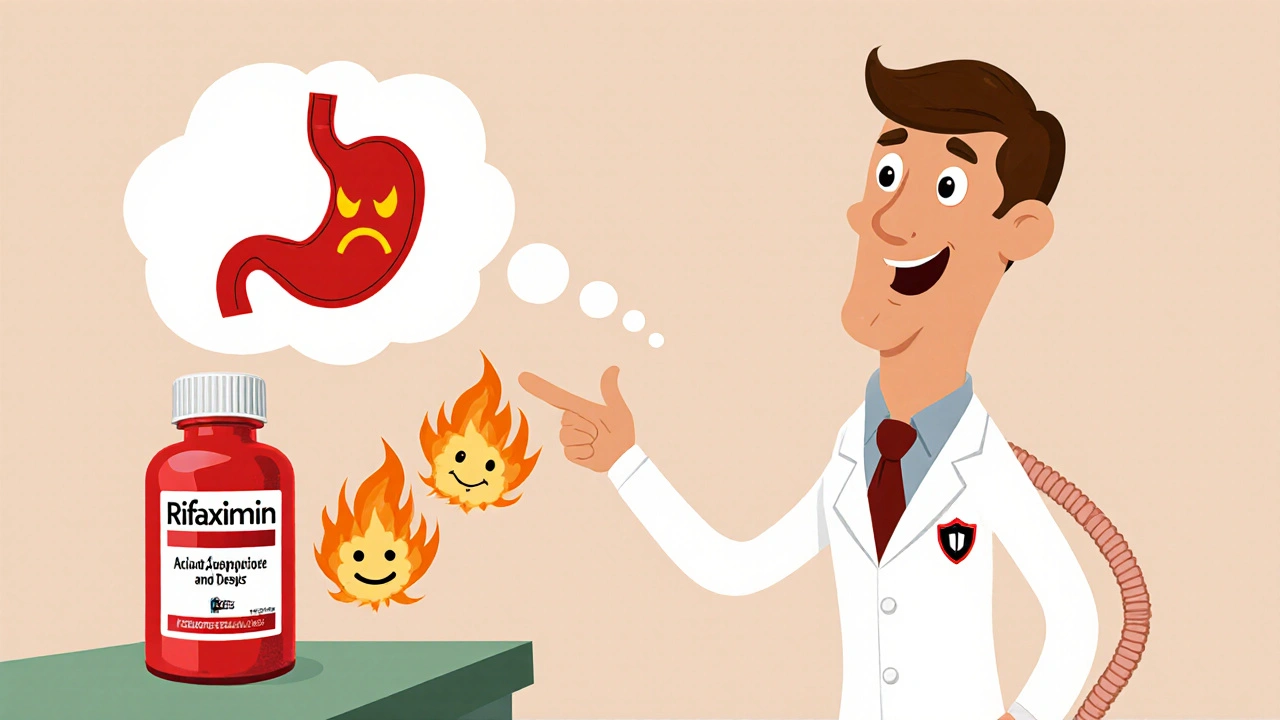Rifaximin Eligibility Assessment Tool
GERD Treatment Assessment
Answer a few questions to see if you might be a candidate for rifaximin therapy, which may help reduce GERD symptoms when traditional treatments haven't provided sufficient relief.
Not currently eligible for rifaximin therapy
Rifaximin may not be the best option for you at this time. You might benefit more from continued acid suppression therapy or lifestyle modifications.
- Consider discussing long-term acid suppression strategies with your doctor
- Try dietary modifications, particularly a low-FODMAP diet
- Implement lifestyle changes like weight management and sleep position adjustments
Why Rifaximin Is Gaining Attention in GERD Care
When you hear the word rifaximin, you probably think of travel‑related diarrhea or hepatic encephalopathy. Yet a growing body of clinical evidence shows the gut‑targeted antibiotic can also calm the burning flare‑ups that define gastroesophageal reflux disease (GERD). This article walks you through the science, the practical dosing tips, and the situations where rifaximin might be a better fit than the usual acid‑suppressing drugs.
Defining the Players
Rifaximin is a minimally absorbed, broad‑spectrum antibiotic that stays largely within the intestinal lumen, sparing systemic exposure. Because it hardly reaches the bloodstream, it has a low risk of typical antibiotic side effects.
Gastroesophageal Reflux Disease is a chronic condition in which stomach acid repeatedly flows back into the esophagus, causing heartburn, regurgitation, and sometimes esophageal injury. Roughly 20 % of adults in Western countries report weekly symptoms, making it one of the most common gastrointestinal complaints.
Other key terms that shape the discussion include:
- Proton Pump Inhibitor is a class of drugs that block the stomach’s acid‑producing pump, providing long‑lasting acid suppression.
- H2 blocker is an older acid‑reducing medication that works by blocking histamine receptors in gastric parietal cells.
- Gut microbiome is the community of bacteria, fungi, and viruses living in the gastrointestinal tract, influencing digestion, immunity, and even gut‑brain signaling.
- Small Intestinal Bacterial Overgrowth is an excess of bacteria in the small intestine that can generate gas, bloating, and, indirectly, reflux episodes.
- Lower Esophageal Sphincter is a muscular ring at the top of the stomach that normally prevents backflow of acidic contents.
How Rifaximin May Influence GERD Symptoms
The link between the gut microbiome and reflux is still being mapped, but three mechanisms have solid backing:
- Reducing gas‑producing bacteria. Overgrowth of fermenting microbes creates excess intragastric pressure, pushing acid upward. By selectively wiping out these organisms, rifaximin can lower the mechanical drive for reflux.
- Modulating inflammation. Certain bacterial metabolites trigger low‑grade inflammation in the esophageal mucosa, making the lining more sensitive to acid. Rifaximin’s anti‑inflammatory effect may dampen that response.
- Improving gastric emptying. A healthier microbial profile can enhance motility, allowing the stomach to clear its contents faster and reducing the time the sphincter is exposed to acid.
Clinical trials in the last two years-most notably a 2024 double‑blind study involving 156 patients with refractory GERD-showed a 38 % reduction in heart‑burn frequency after a 14‑day rifaximin course, compared with a 12 % drop in the placebo group.
When to Consider Rifaximin Over Traditional Acid‑Suppressors
Not every GERD patient will benefit from an antibiotic. The sweet spot tends to be:
- People who have tried Proton Pump Inhibitors or H2 blockers for at least eight weeks with limited relief.
- Patients whose symptoms worsen after meals rich in fermentable carbs (the classic “FODMAP” trigger).
- Individuals diagnosed with Small Intestinal Bacterial Overgrowth through breath testing.
Because rifaximin does not alter stomach acidity, it can be combined with a low‑dose PPI for people who need both microbial and acid control.

Dosage, Treatment Length, and Safety Profile
Typical regimens for GERD‑related trials were:
- 550 mg orally, twice daily, for 10-14 days.
- Repeat courses allowed after a four‑week wash‑out if symptoms recur.
Key safety points:
- Because less than 0.5 % of the dose is absorbed, systemic side effects are rare.
- The most common adverse events are mild GI disturbances (nausea, flatulence) and transient headache.
- Resistance development is a theoretical concern, but studies to date have not shown clinically meaningful resistant strains after short courses.
Comparing Rifaximin With Conventional GERD Therapies
| Attribute | Rifaximin | Proton Pump Inhibitor (e.g., Omeprazole) | H2 Blocker (e.g., Ranitidine) |
|---|---|---|---|
| Primary Action | Modulates gut microbiota, reduces bacterial gas production | Inhibits gastric H+/K+ ATPase → acid suppression | Blocks histamine H2 receptors → moderate acid reduction |
| Systemic Absorption | ~0.5 % (minimal) | High (systemic) | Low‑moderate |
| Typical Course for GERD | 10‑14 days (repeat if needed) | Daily, long‑term | Daily, long‑term |
| Common Side Effects | Flatulence, mild nausea, headache | Headache, nutrient malabsorption, risk of C. difficile | Rare‑but possible dizziness, liver enzyme elevation |
| Impact on Microbiome | Targets luminal bacteria, relatively sparing of beneficial strains | Can promote overgrowth of oral bacteria in the gut | Minimal impact |
For patients who struggle with medication adherence or worry about long‑term acid suppression, the short, targeted pulse of rifaximin offers a compelling alternative.
Practical Tips for Clinicians and Patients
- Screen for SIBO. A breath test before prescribing can predict a stronger response.
- Combine strategically. Pair a 14‑day rifaximin course with a low‑dose PPI to cover both microbial and acid pathways.
- Monitor recurrence. If symptoms return within three months, a repeat course or a maintenance diet low in fermentable carbs may help.
- Educate about resistance. Emphasize that short courses have not shown resistance, easing patient anxiety.
- Watch for drug interactions. Rifaximin is a P‑glycoprotein inhibitor; check concurrent use of certain antivirals or chemotherapy agents.

Potential Pitfalls and How to Avoid Them
Even a well‑tolerated antibiotic isn’t free of drawbacks. Common missteps include:
- Over‑reliance on antibiotics. Using rifaximin as a first‑line for every heartburn case can lead to unnecessary drug exposure.
- Skipping lifestyle measures. Diet, weight management, and sleep‑position changes remain core GERD therapy.
- Ignoring contraindications. Patients with severe liver impairment (Child‑Pugh C) should avoid rifaximin.
Balancing rifaximin with a holistic approach yields the best outcomes.
What the Latest Guidelines Say
As of the 2025 update of the American College of Gastroenterology (ACG) guidelines, rifaximin holds a “conditional recommendation” for patients with refractory GERD who have documented SIBO or who have failed at least two acid‑suppressing agents. The guideline notes the need for more long‑term safety data but acknowledges the drug’s favorable side‑effect profile.
FAQ - Your Most Common Questions Answered
Can rifaximin cure GERD permanently?
No. Rifaximin can reduce symptom frequency and severity, especially when bacterial overgrowth drives reflux, but it does not fix the underlying anatomical issues such as a weak lower esophageal sphincter. Ongoing lifestyle management and, if needed, maintenance therapy are still required.
Is it safe to take rifaximin together with a PPI?
Yes, most clinicians prescribe a short rifaximin course alongside a low‑dose PPI. Since rifaximin stays in the gut and the PPI works at the stomach lining, there’s no known pharmacologic conflict. Monitor for rare liver enzyme changes if you have pre‑existing liver disease.
How often can I repeat a rifaximin course?
Current evidence suggests a repeat course every 3-4 months is safe provided the total annual exposure stays under 12 weeks. Your doctor should evaluate symptom patterns before each repeat.
Will rifaximin affect my gut bacteria long‑term?
Because the drug is non‑systemic and only briefly reduces specific bacterial populations, the gut microbiome typically rebounds within weeks after treatment. Some studies show a modest increase in beneficial Bifidobacteria after a short course.
Are there any foods or supplements I should avoid while on rifaximin?
There’s no direct food interaction, but high‑FODMAP foods (like onions, garlic, wheat) can re‑feed fermenting bacteria, potentially blunting the drug’s effect. Pairing rifaximin with a low‑FODMAP diet often yields the best results.
Bottom Line: Should You Talk to Your Doctor About Rifaximin?
If you’ve tried the usual acid blockers and still wake up with a burning chest, ask your gastroenterologist whether a short rifaximin regimen could be part of a rescue plan-especially if you have signs of bacterial overgrowth. Remember, antibiotics are a tool, not a cure, so they work best when paired with diet, weight control, and proper sleep positioning.
 Sep, 18 2025
Sep, 18 2025

Selina M
September 18, 2025 AT 22:06Hey folks! I just read about rifaximin and thought it was pretty cool how it hits the gut microbes instead of the whole body. If you’ve tried PPIs forever with no luck, this might be a game changer. The short 2‑week course sounds easy to fit into a busy schedule. Plus, the side effects seem pretty mild so it’s worth a chat with your doc.
Nicholai Battistino
September 18, 2025 AT 22:08Rifaximin can be a useful add‑on for refractory GERD.
Suraj 1120
September 18, 2025 AT 22:23The idea of tossing another antibiotic at a chronic condition like GERD smacks of medical quick‑fix culture.
Sure, the studies show a 38% drop in heart‑burn episodes, but the sample sizes are still modest.
What worries me more is the looming threat of resistance when we start using rifaximin as a pop‑off remedy.
The gut microbiome is a delicate ecosystem and wiping out gas‑producing bacteria can have ripple effects.
Some patients report increased bloating after the course, suggesting an imbalance.
Moreover, the long‑term safety data beyond a few weeks is practically non‑existent.
If you combine rifaximin with a PPI you’re essentially masking two problems without fixing the underlying LES weakness.
Lifestyle factors like weight, diet, and sleep position remain the cornerstone of GERD management.
Relying on a 14‑day pill binge can give false hope and delay more sustainable interventions.
The cost of repeated courses every quarter can also add up quickly for patients without insurance coverage.
While the drug does have minimal systemic absorption, the repeated gut exposure could select for multidrug‑resistant organisms.
The guidelines only give it a conditional recommendation, highlighting the need for more robust evidence.
I’d advise anyone considering rifaximin to first get a proper SIBO breath test.
If the test is negative, you’re probably better off optimizing diet and possibly a surgical evaluation for a hiatal hernia.
In short, think of rifaximin as a short‑term adjunct, not a cure‑all, and discuss the risks with a gastroenterologist.
Shirley Slaughter
September 18, 2025 AT 22:40Rifaximin’s targeted approach is fascinating, especially for those who can’t tolerate high‑dose PPIs. The fact that it stays mostly in the lumen means fewer systemic headaches and nutrient issues. A short 10‑14 day regimen can reset the bacterial balance and relieve the pressure that triggers reflux. However, it’s not a magic bullet-dietary habits still play a huge role. Pairing it with a low‑FODMAP plan often yields the best results. Keep an eye on any lingering bloating after the course, as that can signal a need for probiotic support.
Sean Thomas
September 18, 2025 AT 22:40What Suraj doesn’t mention is how Big Pharma pushes rifaximin to keep us dependent on endless drug cycles. The “resistance” scare is just a ploy to sell newer, more expensive antibiotics. If you’re sick of being patronized by corporate doctors, demand a natural gut‑reset instead.
Aimee White
September 18, 2025 AT 22:41Honestly, the whole “targeted” hype feels like a smoke‑screen. They dress up a simple molecule with fancy buzzwords while the real agenda is to monetize every flare‑up. Trust your gut instincts and steer clear of anything that sounds like a cash‑grab.
Javier Muniz
September 18, 2025 AT 22:56Guys, if you’re thinking about trying rifaximin, start with a solid SIBO test to see if bacterial overgrowth is really driving your reflux. A 14‑day course can be a good “reset” but don’t ditch the lifestyle basics – stay upright after meals, lose a few pounds if needed, and watch out for trigger foods. Talk to your doc about maybe pairing a low‑dose PPI just for the short run. Most folks feel a noticeable dip in heart‑burn within a week, which is a great sign. Keep a symptom diary so you can gauge if the improvement sticks after the antibiotics finish.
Sarah Fleming
September 18, 2025 AT 22:58One must also consider the clandestine research labs that craft such “reset” drugs in the shadows, manipulating gut flora to keep the populace docile. The glittering promise of a quick fix blinds us to the deeper metabolic sabotage at play. True healing lies beyond these engineered pharmacopeias.
Debra Johnson
September 18, 2025 AT 23:13It is imperative to approach the use of rifaximin with scholarly caution; the literature, while promising, is still nascent. Patients must be informed of both benefits-namely, reduction in fermentative gas production-and potential drawbacks-such as perturbation of commensal flora. Moreover, the ethical dimension cannot be ignored: prescribing antibiotics for a non‑infectious condition bears responsibility for antimicrobial stewardship. Physicians ought to obtain a documented SIBO diagnosis prior to initiation. Lastly, lifestyle modifications should not be relegated to mere footnotes; they remain the cornerstone of gastro‑esophageal reflux disease management.
Andrew Wilson
September 18, 2025 AT 23:15Yo, I totally get the need for caution but honestly the doc’s gonna weed out the risks real quick. If u got SIBO test results, why not give the short course a shot? It’s not like you’re poppin’ a lifelong med.
Kristin Violette
September 18, 2025 AT 23:30From a pathophysiological standpoint, rifaximin’s efficacy can be attributed to its selective inhibition of Gram‑negative anaerobes implicated in excess intragastric pressure generation. By attenuating bacterial fermentation, the resulting decrease in luminal hydrogen and methane curtails transient lower esophageal sphincter relaxations. Additionally, the anti‑inflammatory properties mediated via down‑regulation of nuclear factor‑κB pathways may reduce esophageal mucosal hypersensitivity. Clinicians should therefore consider integrating rifaximin into a multimodal algorithm that includes gastric emptying studies, 24‑hour pH monitoring, and dietary counseling focused on fermentable carbohydrate restriction.
Theo Asase
September 18, 2025 AT 23:31The so‑called “multimodal algorithm” is nothing but a bureaucratic maze designed to keep us chained to endless testing while the pharma elite cashes in on each added procedure. True wisdom lies in challenging this system, not in bowing to its convoluted protocols.